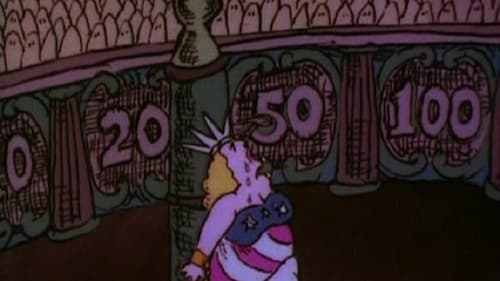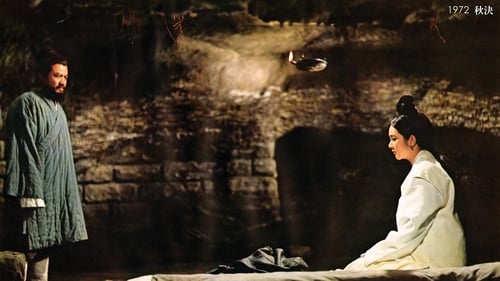To Be Continued (2007)
Género : Documental
Tiempo de ejecución : 22M
Director : Amit Dutta
Sinopsis
An ascetic walks through the narrow streets of a village every morning while his family is still asleep. In his semi-somnolent state he dreams about the history of the village mixing up myths, folklore and facts.

While listening to a tedious lecture on the Soviet threat, Wisconsin Dells’ Tuesday Club members fall asleep and find themselves laboring in an all-women collective in Russia under the unflinching eye of the Soviet special police

"In Chakra, I was able to transfer the traditional order of the chakras into a film, starting with the first (lower) chakra and working up to the seventh (top) chakra…" - Jordan Belson

A surrealist saga in four parts: 1.) The credit sequence in which title cards show successively larger foetuses pulsating on the screen until the baby is born and cries.
2.) Etoile-directly referring to Cocteau, Lethem shows an adolescent sucking a starfish and then giving birth to a smaller starfish. A statement of inadequacy. To give birth involves an emasculation and a loss of vitality.
3.) Corps-two images of a man on a couch groping for each other, watched by a mysterious peeping Tom. As the two superimposed images come together, the heavy breathing subsides…the statement that the birth of desire is a self – realisation.
4.) Hymen – The decaying body of a girl is shot through green filters, and the final image reveals her vagina crawling with maggots and overlain with a crucifix. A representation of Catholicism preventing the free expression of desire.

A formal 1861 portrait of a Chinese Mandarin and his wife is the starting point for this allegorical investigation of the fantasies spawned in the West about the East, particularly that which associates femininity with the mysterious Orient. ADYNATA presents a series of oppositions-male and female images, past and present sounds-which in and of themselves construct a minimal and fragmentary narrative, an open text of our imaginations, fears and fantasies.

Uncle Sam has been living peacefully in the American southwest, running a gas station. But when terrorists kidnap the Statue of Liberty, Uncle Sam teams up with an eagle to go rescue her.

Simple objects, photographs, and events prompt Frank to self-conscious rumination. From his homes in New York and Nova Scotia and on visits to friends, the artist contemplates his relationships, the anniversary of his daughter's death, his son's mental illness, and his work.

Documentary film and home movie about Dwight Core, Jr., a boy with Down syndrome. The footage was originally shot throughout the 1960s and 1970s by Core's father, Dwight Core, Sr. The footage was later discovered and completed by the filmmaker's grandson, George Ingmire

A young boy gets caught stealing a sheep and is shaved of all his hair and branded with a mark on his forehead so that everyone will know that he is a thief and not to be trusted. Dumped in the desert, the thief covers his marking with a headscarf and goes to the nearest village where he is taken in by a trusting family in return for his work. However, has be actually changed or is he still the same thief at heart?

The U.S. Army Signal Corps Pictorial Division made this short documentary shortly after the end of WWII to look at the after-effects of the atomic bombs dropped on Hiroshima and Nagasaki. There is no credited crew or cast.

A short documentary that explores a blue-collar community’s growing unease with the Vietnam War. It was produced in response to President Nixon’s famous November, 1969 speech when he contrasted the unlawful and vocal anti-war protesters to the respectful “silent majority” who were in favor of remaining in Vietnam to fight communism. This film explores the thoughts and opinions of the “silent majority” represented by the folks living in the Garfield Ridge neighborhood on the southwest side of Chicago.

Peigang, his family's only son for three generations running, is to be executed on account of larceny, but not without the intervention of his grandmother.

A film about three of our leading visual artists, Bhupen Khakar, Nalini Malani and Vivan Sundaram. It takes, as its point of departure, a glass mural on which all three were working, then zeros into each of them. It links them to their physical and mental worlds through cinematic devices like associative sounds, variable light and montage. Compositionally, the visuals aim to link with the styles of each artist, as well as the larger narrative traditions of India.

A mounted Mexican president poses for the camera.

A documentary overview of silent cinema pioneer Edwin S. Porter.

A leading director of the Czech film renaissance provides a philosophical meditation on life and death, set amidst complex hospital apparatus and the sadness, hope, or resignation of the patients. Existentialist rather than optimist, the approach is one of humanistic atheism, accepting death as part of life. Interviews with doctors and nurses explore their outlook; all speak of death as a fact, without either sentimentality or religiosity. The studied objectivity of the film only imperfectly hides an intense emotionality.

Universal Citizen is a multifaceted personal travelogue that brings us to a real Universal Hotel, in Guatemala, and to the same public square in Siena that appears at the beginning of Universal Hotel; at the center of the film are Thompson's off screen meetings with a Libyan Jew and former Dachau inmate who works as a smuggler in Guatemala and refuses to be photographed. (Jonathan Rosenbaum)

Life, customs and the fight for survival in the desolate wastelands of the Venezuelan plains.

Featuring the stories and music of seminal Cajun musicians "Bois Sec" Ardoin and Canray Fontenot, Dry Wood is a short, vibrant documentary portrait of life, food, music and festivity in the Louisiana Delta from the singular Les Blank. Preserved by the Academy Film Archive in 1999.

The Ax Fight (1975) is an ethnographic film by anthropologist and filmmaker Tim Asch and anthropologist Napoleon Chagnon about a conflict in a Yanomami village called Mishimishimabowei-teri, in southern Venezuela. It is best known as an iconic and idiosyncratic ethnographic film about the Yanomamo and is frequently shown in classroom settings.






